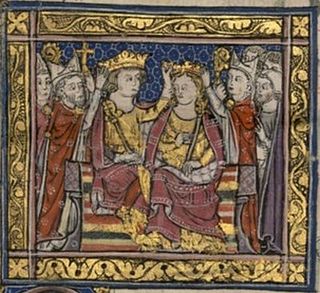 W
WCielo d'Alcamo was an Italian poet, born in the early 13th century. He is one of the main exponents of the Italian medieval jester poetry. His traditional surname has been differently identified by other scholars as Dal Camo or Dalcamo.
 W
WPietro della Vigna was an Italian jurist and diplomat, who acted as chancellor and secretary (logothete) to Emperor Frederick II. Falsely accused of lèse-majesté, he was imprisoned, blinded and committed suicide soon after. He is mentioned in the Inferno of the Divine Comedy by Dante Alighieri.
 W
WEnzo was an illegitimate son of the Hohenstaufen emperor Frederick II, who appointed him 'King of Sardinia' in 1238. He played a major role in the wars between Guelphs and Ghibellines in the Imperial kingdom of Italy, and was captured by his enemies in 1249. He remained imprisoned in Bologna until his death.
 W
WGuido delle Colonne was a 13th-century Italian judge and writer, living at Messina, who wrote in Latin. He is the author of a prose narrative of the Trojan War entitled Historia destructionis Troiae, that was based on De excidio Trojae historia written by Dares Phrygius and Ephemeridos belli Trojani written by Dictys Cretensis.
 W
WJohn of Brienne, also known as John I, was King of Jerusalem from 1210 to 1225 and Latin Emperor of Constantinople from 1229 to 1237. He was the youngest son of Erard II of Brienne, a wealthy nobleman in Champagne. John, originally destined for an ecclesiastical career, became a knight and owned small estates in Champagne around 1200. After the death of his brother, Walter III, he ruled the County of Brienne on behalf of his minor nephew Walter IV.
 W
WGiacomo da Lentini, also known as Jacopo da Lentini or with the appellative Il Notaro, was an Italian poet of the 13th century. He was a senior poet of the Sicilian School and was a notary at the court of the Holy Roman Emperor Frederick II. Giacomo is credited with the invention of the sonnet. His poetry was originally written in literary Sicilian, though it only survives in Tuscan. His poetry, which was an adaptation to Italian of the Provençal poetry of the troubadours, concerns courtly, chivalrous love.
 W
WPerceval Doria was a Genoese naval and military leader in the thirteenth century. A Ghibelline, he was a partisan of the Hohenstaufen in Italy and served the Emperor Frederick II and Manfred of Sicily as vicar of Romagna, the March of Ancona, and the Duchy of Spoleto.